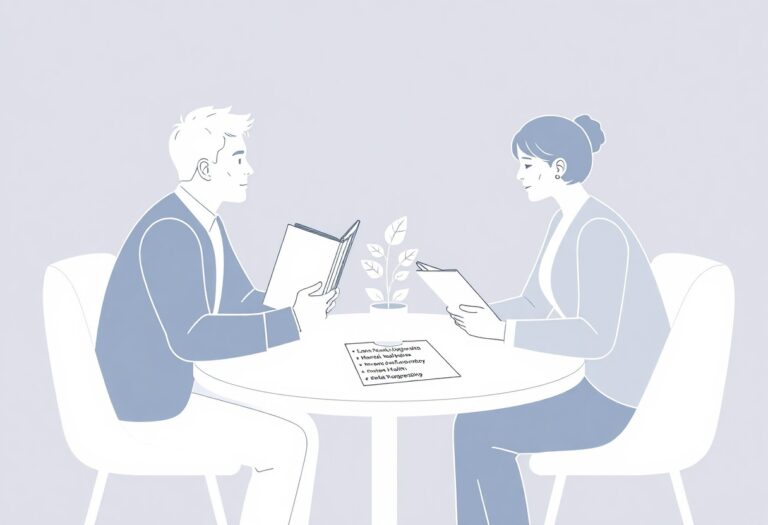7 Signs That Separation Might Be the Healthier Option
Over time, you may find yourself questioning the health of your relationship. Understanding when to let go can be challenging, but recognising the signs separation might be a healthier option is crucial for your well-being. These signs separation might be a healthier option are crucial in understanding your needs. In this post, we’ll explore seven key indicators that suggest a break could lead to a more fulfilling and positive life for you. Taking the necessary steps towards separation may ultimately open the door to greater happiness and personal growth.
Key Takeaways:
Understanding the Signs Separation Might Be Healthier Option
- Recognising patterns of consistent unhappiness can indicate the need for separation to foster personal well-being.
- Effective communication breakdown within the relationship often signals deeper underlying issues that may not be resolvable.
- Consideration of emotional and physical health is vital; persistent stress or anxiety may be signs that separation is necessary.
- Feeling unsupported or disregarded in personal goals and aspirations can show that the relationship is no longer beneficial.
- When both partners are unwilling to work towards mutual solutions, separation might provide the opportunity for personal growth and healing.
Recognising Emotional Distress
The importance of recognising emotional distress in your relationship cannot be overstated. When you find yourself frequently overwhelmed by feelings of sadness, anxiety, or frustration, it may be a signal that your relationship is affecting your well-being. Acknowledging these emotions is the first step toward addressing the issues at hand and considering the possibility of separation as a healthier choice for your emotional state.
Persistent Unhappiness
At times, you may notice a lingering sadness that overshadows your days. This persistent unhappiness can manifest as a lack of interest in activities that once brought you joy, an inability to connect with loved ones, or a feeling of emptiness that simply won’t fade. These feelings are imperative indicators that something is amiss in your relationship, and addressing this unhappiness is vital for your overall well-being.
Impact on Mental Health
Emotional distress can have a profound impact on your mental health. When you are consistently exposed to negative emotions, it can lead to an increased risk of anxiety disorders or depression. Long-term emotional turmoil can also affect your self-esteem, leaving you feeling powerless and drained. Addressing these feelings and seeking support is imperative in order to prevent further deterioration of your mental health and to create a healthier, more fulfilling future.
Distress in relationships can lead to a spiral of negative thoughts and feelings. If you find yourself feeling overwhelmed, it’s imperative to take a step back and assess the toll it’s taking on your well-being. Seeking professional help or confiding in trusted friends can provide you with perspective and coping strategies. Finding a way to prioritise your mental health is not only beneficial in the moment, but it also fosters resilience and a healthier outlook on future relationships.
Communication Breakdown
There’s a significant divide in your relationship when communication starts to falter. Continual misunderstandings or a lack of meaningful dialogue can lead to feelings of isolation and resentment. If you find that you and your partner are no longer effectively expressing your thoughts and emotions, it may be a clear indicator that separation could be the more beneficial path for both of you.
Inability to Resolve Conflicts
After repeated attempts to address disagreements, you may notice that conflicts remain unresolved. If each resolution leaves you feeling more frustrated and unheard, it might be a sign that your relationship has reached an impasse. The cycle of unresolved issues may indicate that you and your partner are no longer able to tackle challenges together.
Avoidance of Difficult Conversations
Below the surface, you might be avoiding critical conversations that could lead to positive change. This avoidance may stem from fear of conflict or the potential for emotional turmoil, but it often results in a stagnant and unhealthy relationship. The longer these discussions are postponed, the deeper the rifts in your connection become.
Even minor issues can escalate when you avoid difficult conversations. When you neglect to address the underlying problems, it can lead to feelings of frustration and resentment towards your partner. This avoidance not only prevents growth in your relationship but can also signal deeper emotional disconnects. Prioritising open communication is necessary, and if you find yourself struggling to engage in honest dialogue, consider the possibility that separation may provide the clarity and relief you need.

Diminished Trust
Now that you recognise the importance of trust in a relationship, it’s necessary to acknowledge signs that this trust may be fading. When secrecy and doubt cloud your interactions, it’s a clear indicator that your connection is deteriorating. If you find yourself questioning your partner’s intentions or feeling consistently suspicious, it may be time to face the reality that separation could provide the healing space both of you need.
Signs of Betrayal
About betrayal, it can manifest in various forms, whether through infidelity, lying, or emotional withholding. If you’ve caught your partner in a significant lie or noticed repetitive dishonesty, these actions can leave deep emotional scars. Instances of betrayal often lead to shattered trust and heightened feelings of insecurity in the relationship.
Erosion of Confidence in Each Other
Confidence in your partner and, consequently, in your relationship may start to wane. When trust diminishes, you may feel increasingly sceptical about your partner’s decisions and actions, which can breed resentment and disappointment.
Erosion of trust signifies that your mutual confidence is fading, leading to a breakdown in communication and understanding. You might notice that you are avoiding conversations that once felt comfortable, or you are overthinking their words and actions. If you frequently doubt your partner’s ability to provide support or be honest, it becomes nearly impossible to maintain a healthy bond. Therefore, recognising this erosion early can help prevent further emotional damage and may guide you toward a more positive outcome through separation.
Lifestyle Differences
Despite your best efforts to maintain a harmonious relationship, significant lifestyle differences can create an emotional rift. When your day-to-day habits, social preferences, and leisure activities clash, it can lead to frustration and resentment. It’s crucial to evaluate whether these differences contribute positively to your well-being or are driving you further apart.
Diverging Goals and Values
Behind every relationship, shared goals and values serve as the foundation for unity. If you find that your aspirations are becoming increasingly inconsistent with your partner’s, it can be a substantial indicator that separation may be on the horizon. When your core beliefs and future plans diverge, it can erode communication and connection.
Changes in Daily Life Compatibility
An evolving lifestyle can strain a relationship, especially when routines and preferences no longer align. Evaluate whether you and your partner find solace in the same activities or if your daily choices have become sources of conflict. Are you still enjoying meals together, or do your eating habits differ significantly? At times, such alterations in compatibility may signal the need for reflection. If you feel disconnected or burdened by constant adjustment, it could be crucial to contemplate whether these differences enhance your lives or hinder your happiness together.
Effects on Children
Not considering the impact of separation on your children can lead to unintended consequences. Children are often sensitive to the emotional climate in their homes, and an unhealthy environment can create lasting effects. If you notice that your relationship contributes to a toxic atmosphere, it’s imperative to explore healthier options for both your well-being and that of your children.
Observing Toxic Dynamics
Beside the immediate stress of a dysfunctional relationship, your children may be witnessing unhealthy interactions that can influence their views on relationships. Regular arguments, criticism, or emotional distance can teach them that such behaviours are normal and acceptable, potentially shaping their future connections.
Long-term Impact on Development
Any ongoing exposure to a toxic relationship can adversely affect your child’s mental and emotional development. Studies show that children raised in conflict-heavy environments are more likely to experience issues such as anxiety, depression, and difficulties in forming healthy relationships later in life. The negative lessons learned during these formative years can become ingrained, leading to patterns that repeat in their adult lives.
The effects of a troubled home environment can ripple through your child’s entire development. Children often internalise stress and emotional turmoil, contributing to lower self-esteem and impaired social skills. They may struggle to navigate their relationships or even exhibit behavioural problems in school. Conversely, a more harmonious environment following separation can foster resilience, emotional intelligence, and a healthier understanding of love and relationships, allowing your children to thrive. Prioritising their emotional well-being is imperative for promoting a prosperous future.
Exploring Alternative Solutions
Your relationship may feel unresolvable, but before concluding separation, consider alternative solutions. Engaging in open conversations about your feelings and expectations can often unveil deeper issues. Collaborating on potential compromises and exploring different ways to approach challenges can breathe new life into your partnership. Sometimes, even small adjustments can make a significant difference, allowing both partners to grow closer rather than distance themselves.
Counselling and Support
Around 70% of couples who seek professional counselling report improved relationships. Engaging with a counsellor allows you to explore your emotions and gain insights into the dynamics of your partnership. Support groups can also offer community encouragement, as sharing experiences with others can foster connection and healing.
Assessing the Possibility of Reconciliation
Beside seeking outside help, you should take time to reflect on what both of you truly want from the relationship. Consider if the underlying issues are addressable and whether both partners are willing to make the necessary changes for reconciliation. This honest examination can pave the way for a renewed commitment or provide clarity on the path to separation.
For instance, if you identify key problems causing emotional distance, addressing them openly could be a turning point. Discussing fears and aspirations might lead you both to realise that love and connection still exist underneath the turmoil. If both partners are determined to improve themselves and the relationship, implementing healthy communication patterns and adjusting behaviour can lead to a stronger bond. However, if you find one partner unwilling to engage or change, embracing the reality of separation might become necessary for your well-being.
To wrap up
On the whole, recognising the signs that separation may be the healthier option for you can empower you to make decisions that prioritise your well-being. If you find yourself constantly unhappy, feel more alone than connected, or realise that your relationship hinders your personal growth, it might be time to evaluate your situation. Acknowledging these signs allows you to take a step back, assess your needs, and consider what steps might lead to a healthier future, either independently or through redefining your relationship dynamics.
FAQ
Q: What are the primary signs that indicate separation could be a healthier choice?
A: Some primary signs include persistent unhappiness or dissatisfaction in the relationship, frequent arguments that lead to emotional distress, a lack of communication or connection, differing life goals or values that create significant conflict, and emotional or physical abuse. Recognising these signs can help individuals consider separation as a viable option for personal well-being.
Q: How does emotional disconnect suggest that separation might be beneficial?
A: Emotional disconnect may manifest as feelings of loneliness, indifference, or a lack of intimacy with your partner. If attempts to rekindle emotional closeness have failed and you find more comfort in solitude than with your partner, this could signal that separation may provide the space needed to rediscover personal happiness and emotional health.
Q: Can physical or emotional abuse be a reason to consider separation?
A: Yes, any form of abuse—be it physical, emotional, or psychological—indicates that separation is not only a healthier option but also a necessary one for personal safety and mental well-being. Leaving an abusive relationship can be a vital step towards reclaiming agency and finding a safer, more supportive environment.
Q: How does ongoing conflict affect the decision to consider separation?
A: Ongoing conflict can lead to an unhealthy pattern of behaviour that erodes trust and respect within a relationship. If constant disagreements leave both partners feeling frustrated, unheard, or angry, it might point to a deteriorating dynamic. Evaluating the potential for resolution versus the reality of unending conflict can help inform the decision to separate.
Q: Is it common to question the compatibility of life goals in a relationship, and how might this lead to separation?
A: Yes, questioning compatibility regarding life goals, values, and priorities is common. When partners find themselves on drastically different paths—such as differing views on family, career ambitions, or lifestyle choices—this can cause significant tension. If meaningful discussions do not lead to a shared understanding or compromise, separation might be beneficial for both individuals to pursue their separate aspirations without conflict.








